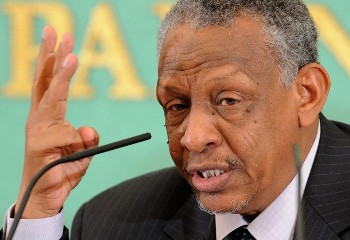US congressman criticises Obama for inviting Sudanese delegation
April 25, 2013 (WASHINGTON) – United States congressman Frank Wolf on Wednesday criticised president Barack Obama’s decision to invite a high-level Sudanese government delegation to Washington, citing examples of violence and human rights atrocities.

He said Nafie had also opposed allowing UN peacekeepers into Sudan’s strife-torn western region Darfur and believed that the ruling party gave up too much power in signing a 2005 US-brokered peace deal that ended more than two decades of civil war with Southern rebels fighting for independence.
The US state department on Tuesday confirmed that Nafie and other officials had accepted an invitation to Washington for a “candid discussion on the conflicts and humanitarian crises within Sudan”.
No date has yet been fixed for the meeting.
It has been a number of years since the US received a high-level delegation from Sudan, which Washington has considered a state sponsor of terrorism since 1993, imposing a raft of sanctions on the country in 1997.
The US also blames Sudan for atrocities committed in Darfur and along the border with South Sudan.
In the letter, Wolf maintains that while diplomacy remains an important tool for pressing Sudan on issues such as human rights abuses, democratic change and the prosecution of perpetrators of genocide, he questioned the logic of bringing the delegation to Washington, saying the US embassy in Khartoum was a far more suitable location for such talks.
Wolf has also questioned the US administration’s overarching policy on Sudan, again urging the appointment of a new special envoy “to engage in high-level diplomacy and to secure meaningful progress on seemingly intractable issues.”
“With Darfur worsening and continued indiscriminate attacks on civilians in the Nuba Mountains displacing thousands, why would your administration reward Khartoum with an invitation to Washington? Specifically, why would you reward the likes of Nafie Ali Nafie?” he said.
“Is this administration committed to the failed approach of offering “carrots” to an internationally indicted war criminal and architect of genocide who consistently fails to honour agreements?” he added.
In 2009, the International Criminal Court (ICC) issued an arrest warrant against Sudanese president Omer al-Bashir for alleged war crimes and crimes against humanity in Darfur. Nafie has previously denied that ethnic cleansing was ever a driving factor in the government’s counter- insurgency campaign, and in a 2008 interview with the LA Times, he dismissed allegations of genocide in Darfur as US-manufactured “political propaganda”.
On Wednesday, Wolf joined with congressmen Jim McGovern and Mike Capuano in introducing the Sudan Peace, Security and Accountability Act of 2013, which requires the administration to develop a comprehensive strategy for ending serious human rights violations. It also includes provisions to hold those responsible for atrocities committed in Darfur and other parts of Sudan accountable, as well as support the path for democratic reform and foster peace throughout country.
Wolf has been a strong advocate for the Sudanese people for more than two decades. He has travelled to Sudan six times since 1989, most recently in 2012 and was also the first member of congress to travel to Darfur in 2004. Earlier this year, he wrote to secretary of state John Kerry urging him to appoint a special envoy to Sudan.
Last December, the White House abruptly announced the resignation of former special envoy to Sudan Princeton Lyman, who held the post since March 2011. No reason was given for his departure but sources attributed it to health reasons.
Lyman had been well regarded for his efforts at diplomacy and peace building, particularly during the transition from a united Sudan to a partitioned one in July 2011.
(ST)
